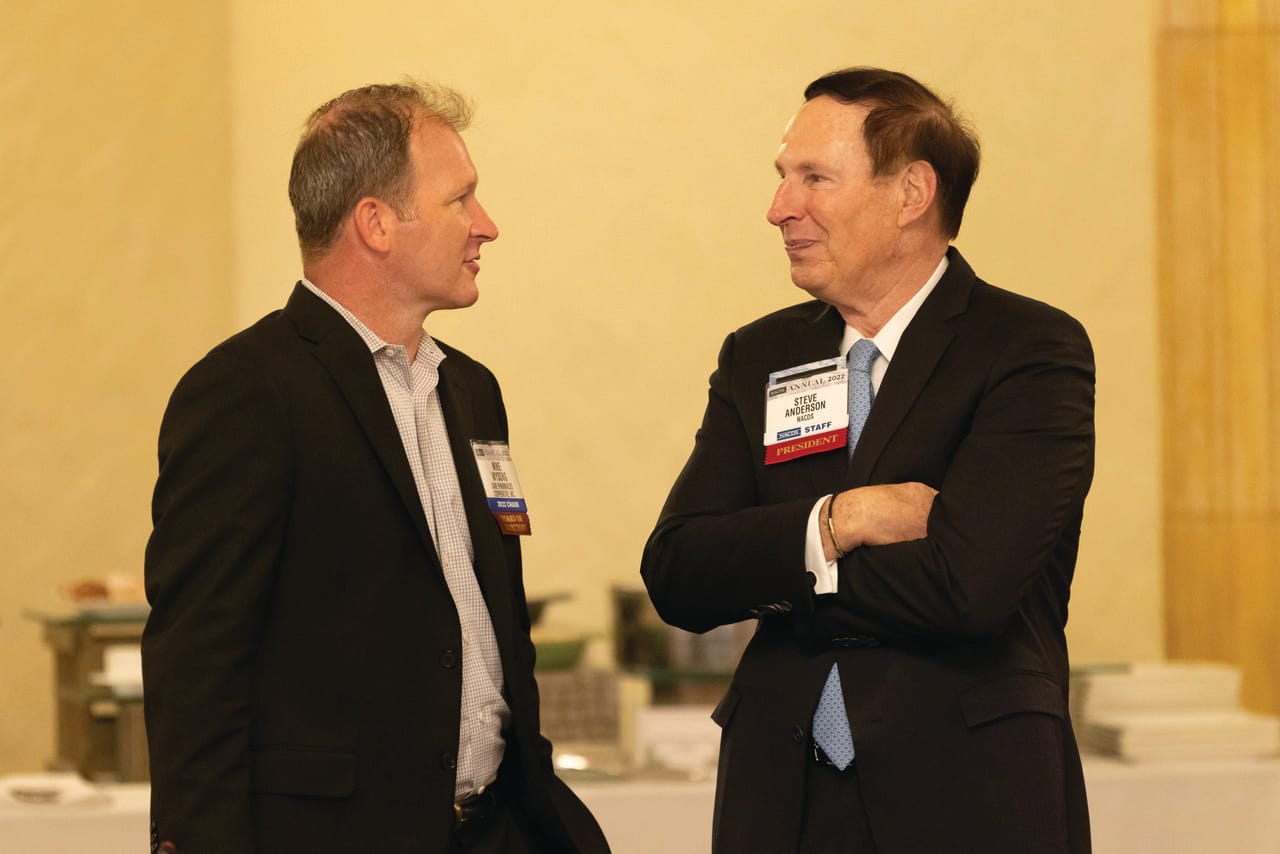PALM BEACH, Fla. — When succession plans for the National Association of Chain Drug Stores’ chairmanship were disrupted by an executive change at Rite Aid earlier this year, the group was fortunate to have one of the industry’s most dynamic young leaders waiting in the wings. Mike Wysong, who had been slated to serve as NACDS vice chairman beginning this month, is instead taking the reins at the association’s Annual Meeting.

Good Neighbor’s Brian Nightengale talks with Mike Wysong.
Wysong, who began his career in pharmaceutical distribution, serving as a vice president at both Cardinal Health and AmerisourceBergen, became chief executive officer of Care Pharmacies in 2010. During his tenure, the member-owned cooperative of community and specialty pharmacies has more than doubled in store count and sales — to 130 locations and $1.41 billion, respectively — earning it a place in the National Retail Federation’s “hot 100” ranking for five of the past six years. Now Wysong is poised to utilize the knowledge and experience gained at the company as he leads NACDS during its 90th anniversary year.
“I am very excited to represent the association as the incoming chairman,” Wysong says. “When you look back at the history of NACDS, we as leaders have an obligation to continue the great work that began all those years ago. Back in 1933, there was clearly a sense that the industry would be stronger united than divided, and we need to continue to refine our strategy going forward, but we also need to remain faithful to the original purpose. So, even though what we are doing as care providers and as an association is changing every day, the core purpose remains the same.
“Our association is very focused on promoting a pro-pharmacy and pro-patient agenda. Most of the work that goes into supporting the key initiatives are all aligned around advancing the interests and objectives of chain and community-based pharmacy, while bringing a greater awareness of its ability to serve consumers and patients in bigger and better ways. This is accomplished through grassroots legislative advocacy at both the federal and state levels.
“We understand that the government has a sizable impact on our businesses regardless of our individual political ideologies or persuasions, and engagement with community leaders and influencers is critical to the success of our members. Working collaboratively with strategic partners like NCPA [the National Community Pharmacists Association], NASP [the National Association of Specialty Pharmacy] and other patient advocacy groups helps to drive better awareness and advance the general practice of pharmacy.”
NACDS has long been deeply involved in those areas, earning a seat at the table whenever health care policy is under serious consideration. Wysong is quick to praise the work of Brian Nightengale, his predecessor at NACDS and the executive responsible for AmerisourceBergen’s Good Neighbor Pharmacy network.
“Brian did an excellent job on many fronts of making sure that the pro-patient, pro-pharmacy agenda was moved forward during his term,” notes Wysong. “We saw that first-hand at the last RxImpact Day, with many of our congressional and senatorial visits resulting in support for meaningful DIR [direct and indirect remuneration fee] reform. We also need to continue to promote the work that was done by our members during the pandemic to ensure proper pharmacy access. That means codifying the Prep Act at the state level, and enacting HR 1770 — to create a reliable payment mechanism for pharmacy services under Medicare.
“I also want to make sure that NACDS remains the optimum place for retailers and suppliers to collaborate in the service of patients and consumers. The NACDS 2023 initiative will require industry shareholders to work collaboratively, if we are to adequately address the systemic issues driving up health care costs in the country today. We are much better off as an industry when we can congregate and contemplate all the new ways we could serve our collective patients.”
Wysong’s commitment to collaboration extends beyond pharmacy and health care. His vision is consistent with the association’s holistic approach, embodied in its annual Total Store Expo, which will be held next August in San Diego.

Incoming NACDS chair Mike Wysong and CEO Steve Anderson.
“The front-end business and consumer product group categories are an extremely important aspect of the NACDS program,” Wysong says. “The Retail Advisory Board is responsible for identifying emerging trends and areas of opportunity for partnership and innovation. I had a chance to attend several of the Retail Advisory Board meetings last year, and they were outstanding. There were robust conversations about health and wellness trends, the metaverse, crypto currency, economic dynamics, shopper behavior, and digital trends. The front-end focus and CPG supplier participation is an aspect of the association that is growing and vibrant.”
Vital as the front end is to consumers and retailers, the bedrock of the industry remains pharmacy and health care. With more than 70% of industrywide sales generated by prescription medications, pharmacy issues are the first among equals at NACDS. None is more pressing for the association than countering the adverse impact of pharmacy benefits managers, and their application of DIR fees under Medicare Part D.
“DIR fee reform is extremely important, and the same can be said of comprehensive PBM reform, of which DIR fee reform is a part,” explains Wysong. “The NACDS board of directors has been extremely engaged on this front. We are very focused on making sure that we have true comprehensive PBM reform and not just pieces and parts of it. We are also focused on making sure that we are successful in implementing these changes across all payer segments — Medicare, Medicaid and the commercial markets — and at both the state and federal levels. The fundamental elements of the reform include stopping explosive retroactive fees; below-cost reimbursement; gaming of performance measures; creative ‘specialty definitions’ that allow for steering patients away from their pharmacy; mandatory mail-order; limited networks; overwhelming audits; and stopping the undercutting of PBM reform laws, so we can ensure proper implementation and enforcement.
“As for the FTC study of PBM practices, we will be diligent in answering any of the questions posed to us by the commission, and will also help them understand the proper set of questions that they should consider asking, so they can get to the bottom of the matter and have the relevant facts pertinent to their findings.”
Pharmacy advocates are encouraged by the ongoing PBM probes, but the current political climate and a looming presidential election year could short-circuit the drive toward substantive reform. Wysong is hopeful that progress can be made despite the challenging circumstances.
“There is no question that we are in a dynamic time, both for our industry and our political structures. The current DIR issues, the below-cost reimbursement issues and the access issues are all threats to the sustainability of the current pharmacy model,” he says. “The hyper-partisan politics being played out in Washington, D.C., — and within the states — only adds to the uncertainty of a clear pathway forward for many of the bills that we are supporting. We will continue to maintain a true all branches and all levels of government approach to moving our issues forward.
“Many of the core issues that we are working on already have or are gaining bipartisan support. We have some very good champions at the state and federal levels, and we are consolidating our support around those elected officials who are leading the charge on our key issues.
“I am pragmatically optimistic about advancing key legislation forward despite the obvious political divide. At our NACDS board of directors fly-in at the end of February, we found members of Congress to be extremely conversant on our issues, and they seem to understand what’s at stake for their constituents, for patients and for the pharmacies that serve them.”
Having played a pivotal role in containing the pandemic, the industry now commands a high level of support among policy makers and the public. Members of the pharmacy profession have administered more than 300 million COVID immunizations, and done so with a speed and efficiency no other sector could match. Still, as demonstrated by past experience, memories can quickly fade. The task for NACDS and its members is to convert the current goodwill toward the industry into lasting clout with legislators, regulators and payers in the private sector.
“The pandemic response and quick mobilization of pharmacies across the country underscored the importance of pharmacy access, and the role that pharmacy could play in addressing larger health care issues plaguing our country,” Wysong notes. “The favorable view of pharmacy must be acted on quickly, and we need to make sure that we continue to stay engaged with key stakeholders.
“This issue transcends political affiliation, and we must remain vigilant in our grassroots advocacy. NACDS has a membership presence in every single state and congressional district, and I am not sure there are very many associations that could say that. We have an extremely engaged membership and advocacy community committed to making a difference. Last year alone, NACDS RxImpact advocates welcomed 90 members of Congress into their pharmacies for tours. We need to keep that momentum up and explain why our priority issues are right for their communities and constituents.”
Wysong assumes the NACDS chairmanship at a moment of promise and peril for chain pharmacy. NACDS is working to resolve reimbursement issues favorably while also positioning the industry to play an expanded role in the nation’s health care system, helping address persistent challenges of access, quality and cost. Several of the association’s members are among the leaders in redefining the way patient care is delivered in communities across the country.
“As evolution continues within our industry, there will be a natural expansion of pharmacy-based services being offered by providers. These services will focus on closing the gaps in care while promoting pharmacy’s role in overseeing the patient-provider relationship,” says Wysong. “This oversight will allow pharmacists and pharmacies to drive better outcomes and reduce unnecessary health care related costs. There will also be renewed attention on addressing the systemic issues causing many of these related chronic disease state management challenges.
“The association is focused on making sure that all stakeholders have the tools and access to partners who can help them identify areas of opportunity to close these gaps within the communities that they serve. The NACDS 2023 initiative is focused on ensuring that the association is best positioned to help deliver value to all its members and partners, to promote exploration and innovation in health and wellness. This includes identifying new member companies, as well as technology and consumer product groups, who are focused on addressing the foundational issues driving better health outcomes in general and across communities of high need.”
Wysong stands ready to help NACDS make real progress toward achieving those objectives.









